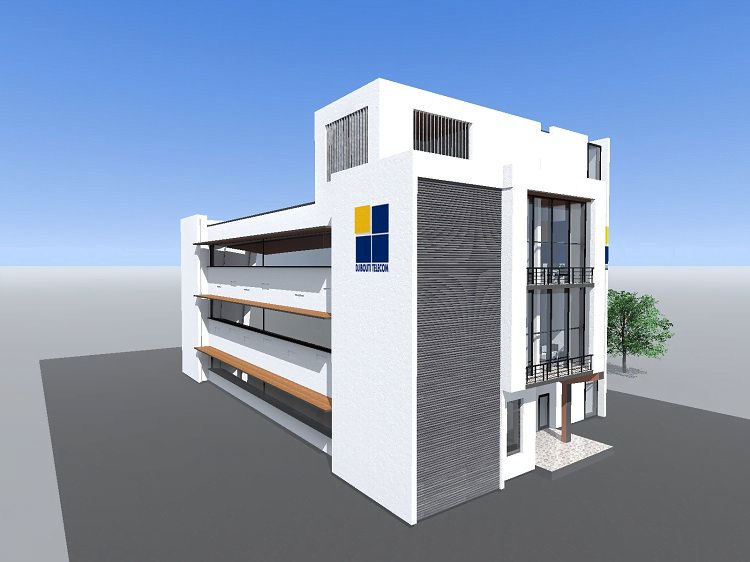Djibouti, at the heart of the global web
As a regional center for digital technology, Djibouti is aiming to become a global technology hub. With the massive deployment of connectivity infrastructure, backed by an ambitious government strategy, the city-state is giving itself the means to achieve its goals and accelerate its digital transformation into a hyper-connected nation.

“I definitely see a ‘Djibouti Beyond Ports,’ a nation that should move itself to becoming an ICT hub globally.” This statement, signed by Akinwumi Adesina, President of the African Development Bank (AfDB), sums up both the potential and the new ambitions of Djibouti, one of the continent’s most connected countries to international networks, owner of submarine cables and a veritable regional digital hub for connectivity and data storage.

This ambition is the result of the government’s intensive efforts in recent years to develop infrastructure on a massive scale, backed by an ambitious strategy. Thanks to its strategic location on the Gulf of Aden, Djibouti, according to a report published by the French Treasury on the telecommunications sector in East Africa, is connected via two access points to nine submarine interconnection cables linking South Asia, the Middle East and the Eastern Mediterranean with Europe and East Africa. These facilities give Djibouti access to international connectivity capacity of up to 1,643 Gigabits per second (of which only 39% is used by Djibouti). Four other submarine cables are under construction: Africa-1, IEX (India Europe Xpress), Raman Submarine Cable System and SEA-ME-WE 6 (Southeast Asia-Middle East-Western Europe 6). Terrestrial cables are also used in Ethiopia and Somalia (39.5% utilization). In addition, the national telephone network consists of eighty-five relay antennas and a Level III data center located in Djibouti-Ville and built in 2013 according to the same report.
Djibouti Telecom, a key player in digital transformation

This infrastructure network is supported by the national telecommunications operator, Djibouti Télécom, which is wholly owned by the Sovereign Fund of Djibouti. Djibouti Télécom plays a central role in providing all ICT services in the country (including fixed telephony, mobile services and bandwidth). Djibouti Télécom was involved in the construction of a ninth submarine cable linking Singapore in Southeast Asia to the French city of Marseille. On the digital front, in 2020 the operator launched Djibouti Digital Money (D-Money), a mobile payment platform designed to facilitate commercial transactions and increase financial inclusion among the population (currently estimated at 25%). It is now possible to pay with a smartphone in the capital and the country’s five regions. To make Djibouti a digital hub in line with Vision 2035, and to give concrete expression to Djibouti Telecom’s important role in the country’s digital transformation, the government of Djibouti has launched an offensive national ICT development strategy.
Making Djibouti a smart nation
With the creation of a Ministry of Digital Economy and Innovation (MENI), headed by Mariam Hamadou Ali, Djibouti has launched a five-year development plan called Djibouti ICI (Inclusion-Connectivity-Institutions). The plan’s main objective is to improve the social and financial integration of the population by reducing the digital divide. To achieve this, the authorities are counting on the private sector to create jobs and value. The goal is to make Djibouti an international digital hub. “It is time to fully harness the potential of cables to make Djibouti a smart nation. We want to make Djibouti a country where tomorrow’s GAFAMs (Google, Apple, Facebook, Amazon and Microsoft) and the major players in the sector will set up shop. By strengthening our skills base and developing our infrastructure, we intend to take full advantage of our strengths, in particular our geo-strategic position, to establish ourselves as a global digital hub,” says Mariam Hamadou Ali. Faced with the challenge of data protection and cybersecurity, the ministry is piloting a “Green Data City” project that aims to turn Djibouti into an archipelago of international-standard data centers powered by green energy.
Strengthening economic growth, innovation and job creation through technology will benefit present and future generations
Djibouti’s ICI roadmap uses digital technology as a real vector for development. As part of the Djibouti Digital Foundation program, the World Bank has just approved $10 million in financing to “accelerate digital transformation and build a more inclusive digital economy” by developing an enabling environment for the gradual introduction of competition and private-sector investment in ICT, fostering the uptake of digital skills and services and ultimately ensuring that more citizens and businesses have access to quality and affordable internet
To this end, the government of Djibouti is working to extend mobile phone and broadband internet coverage to the entire population by 2027. For the time being, according to Data Reportal, the country had around 463,000 telephone subscribers in January 2023, representing a penetration rate of 41%. The number of internet users stood at 777,600, giving a penetration rate of 68.9%. However, only 4.4% of the population owns a smartphone (which provides internet access). There is still a significant digital divide between rural areas and the capital. “Ilyas Moussa Dawaleh, Djibouti’s Minister of Economy, Finance and Industry, recently urged the country to accelerate its digital transformation. “Strengthening economic growth, innovation and job creation through technology will benefit current and future generations.”
Djibouti sets out to conquer space

The sky is now seen as a vital tool for development and sovereignty. As the country prepares to send its first two satellites into orbit, Djibouti has signed a partnership agreement with Hong Kong Aerospace Technology to build a spaceport in the northern region of Obock. According to the preliminary protocol, the government of Djibouti will “provide the necessary land of at least 10 km² for a period of at least 35 years and all necessary assistance for the construction and operation of the Djibouti Spaceport”. The multi-billion-dollar spaceport project will also include the construction of a port facility, power grid and motorway to ensure the reliable transport of aerospace materials. The agreement was signed by the President of Djibouti, Ismail Omar Guelleh, and is expected to be completed within the next five years. This ambitious project will benefit not only Djibouti, but the entire African continent.







